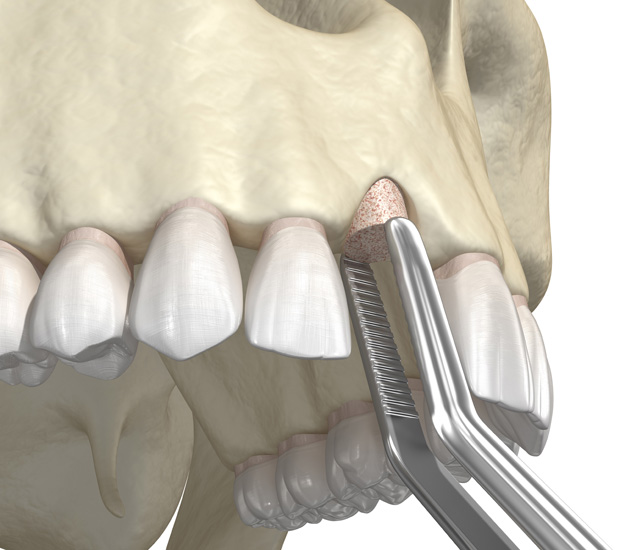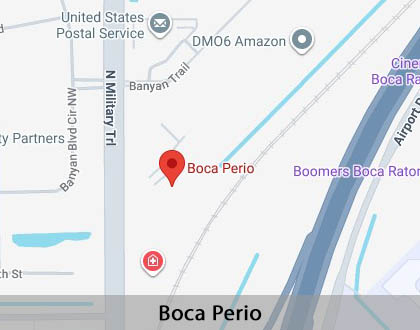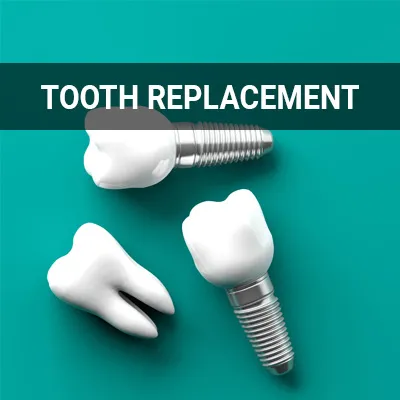Bone Grafting for Dental Implants Boca Raton, FL
A bone graft procedure involves applying a small amount of bone material to the injury site to facilitate wound healing. We perform bone grafting procedures to secure dental implants, especially in cases where the jaw's bone is not substantial enough to integrate the implant successfully.
Bone grafting for dental implants is available at Boca Perio in Boca Raton. If an individual is receiving dental implants and needs bone grafting, we can help. Our team offers a range of treatments to restore oral health. Call us at (561) 763-1066 to learn more or schedule an appointment.
Understanding Bone Grafts
Bone grafting is a procedure that uses bone material for scaffolding or filler for new bone formation. Bone grafting promotes wound healing, whether using material from the patient's body or an artificial substitute. As new bone grows around the graft, it replaces or integrates with the surrounding tissue.
Bone grafting began as a way to heal wounded soldiers. The first bone graft was performed in 1668 when a Dutch doctor used a piece of dog bone to repair a soldier's skull fracture. The procedure was so successful that the canine bone graft was irreremovable after the bone healed.
“Bone grafting is a procedure that uses bone material as for scaffolding or filler for new bone formation.”
Bone Grafts in Dentistry
Bone grafting in dentistry allows for regeneration of the bony ridge of the jaw that contains tooth sockets, called the alveolar bone. Following tooth loss, the goal of an alveolar bone graft is to maintain the jaw's natural contour, fill in dead space, and reduce the risk of infection.
Mainly used for dental implants, a bone graft helps secure the implant and restores blood supply to surrounding tissue. For patients that have put off getting dental implants, a bone graft may be necessary to make up for the significant bone loss. Bone grafting can also help with facial reconstructions or to regenerate alveolar bone lost to gum disease or a traumatic jaw injury.
“Mainly used for dental implants, a bone graft helps secure the implant.”
Bone Graft Benefits
The benefit of bone grafting is that it harnesses the body's natural healing processes. The graft acts as a mineral reservoir, stimulating the production of growth factors and proteins to regenerate the natural bone matrix. In dentistry, bone grafts help stabilize the jawbone and prevent further bone loss.
Bone grafting is especially beneficial for dental implants as the bone graft forms a strong foundation to secure the implant. In addition, because the implant is an artificial tooth root topped with a crown, a bone graft can help integrate the implant into surrounding alveolar bone for improved outcomes. Studies indicate that quality of bone and ability to integrate are measures of implant success.
“In dentistry, bone grafts help stabilize the jawbone and prevent further bone loss.”
Check out what others are saying about our dental services on Yelp: Bone Grafting for Dental Implants in Boca Raton, FL
Bone Grafting Procedure
In a bone graft procedure, we harvest a small amount of bone, either from the hip, tibia, or the back of the jawbone. Alternatively, a graft from another person or animal or artificial bone may be used.
Once we prepare the graft, we will make sure there is room in the gums at the site where the tooth is missing or where bone loss occurs. Next, we place the graft material between the sections of bone that need to grow together and temporarily secure special screws or dissolvable adhesive. The gum incision is then closed with stitches. New bone growth fuses with the graft until fully integrated.
“Once we prepare the graft, we will make sure there is room in the gums at the site where the tooth is missing or where bone loss occurs.”
Questions Answered on This Page
Q. How are bone grafts used in dentistry?
Q. What are the benefits of bone graft?
Q. What happens during a bone graft procedure?
Q. How do I care for a dental bone graft?
People Also Ask
Q. What are some possible complications of unhealthy gums?
Q. What are the common causes of periodontal disease?
Q. What are the kinds of dental implant procedures?
Q. What are the symptoms of periodontitis?
Bone Graft Aftercare
After a dental bone graft, the incision site is packed with gauze, which needs to be changed frequently during the first 24 hours. We will likely prescribe antibiotics to prevent possible infection, along with pain relievers. Further instructions for recovery include:
- Apply ice packs to reduce pain and swelling
- Eat soft, bland foods for the first few days
- Sleep with the head slightly elevated for the first couple of nights
- Avoid hot foods or liquids, like coffee or soup
- Avoid hard or crunchy foods, like nuts
- Refrain from participating in physical activity, especially contact sports
Patients may experience dull pain for a while, but they usually begin to feel normal after a couple of weeks. It may take a few months before the new bone is strong enough to receive a dental implant.
“Sleep with the head slightly elevated for the first couple nights.”
Frequently Asked Questions
Q. What are the types of bone grafts?
A. Bone grafts are described by the source of the graft material:
Q. What is the general approach for dental bone grafting?
A. Autografts are the gold standard for dental grafts in which bone is usually taken from the hip, tibia, or back of the jaw. Autografts are preferred as they promote faster healing and new bone formation.
Q. What dental conditions require bone grafting?
A. While not required for every case, dental repairs that benefit from bone grafting include:
Q. Is an autograft painful?
A. An autograft requires harvesting a small amount of bone from their own body while under anesthesia. Therefore, some post-surgical pain is expected but easily managed with medication; recovery only takes a few weeks.
Q. Are dental bone grafts safe?
A. Bone grafts are commonly used in dental surgery and are usually safe and well-tolerated. Potential risks – however rare – include infection, blood clots, nerve damage, and rejection of the bone graft.
Start Feeling Better – Visit Us Today
By visiting us as soon as possible, our team can help get you the professional treatment you need. Instead of waiting around and allowing the symptoms to get worse, we can provide you with treatment options.
Definitions
Learn More about Bone Grafting for Dental Implants
Bone grafting is a wound healing technique that has been practiced for centuries. For dental implants, bone grafting creates a stronger base and helps integrate the artificial root into the surrounding tissues, allowing for better outcomes and implant success.
If a potential patient is in search of bone grafting for dental implants in Boca Raton, let Boca Perio help. Call us at (561) 763-1066 to learn more about our services and policies or to schedule an appointment.
Helpful Related Links
- American Academy of Periodontology (AAP). American Academy of Periodontology (AAP). 2025
- Center for Disease Control and Prevention (CDC), Periodontal Disease Page. Center for Disease Control and Prevention (CDC), Periodontal Disease Page. 2025
- WebMD, What Is a Periodontist?. WebMD, What Is a Periodontist?. 2025
About our business, license, and website security
- Boca Perio was established in 1990.
- We accept the following payment methods: American Express, Cash, Check, Discover, MasterCard, and Visa
- We serve patients from the following counties: Palm Beach County and Broward County
- We serve patients from the following cities: Boca Raton, Delray Beach, Coral Springs, Pompano Beach and Deerfield Beach
- FL (License #DN6423). View License Information and Specifics
- Healthgrades. View Background Information and Reviews
- Norton Safe Web. View Details
- Trend Micro Site Safety Center. View Details
Back to top of Bone Grafting for Dental Implants










